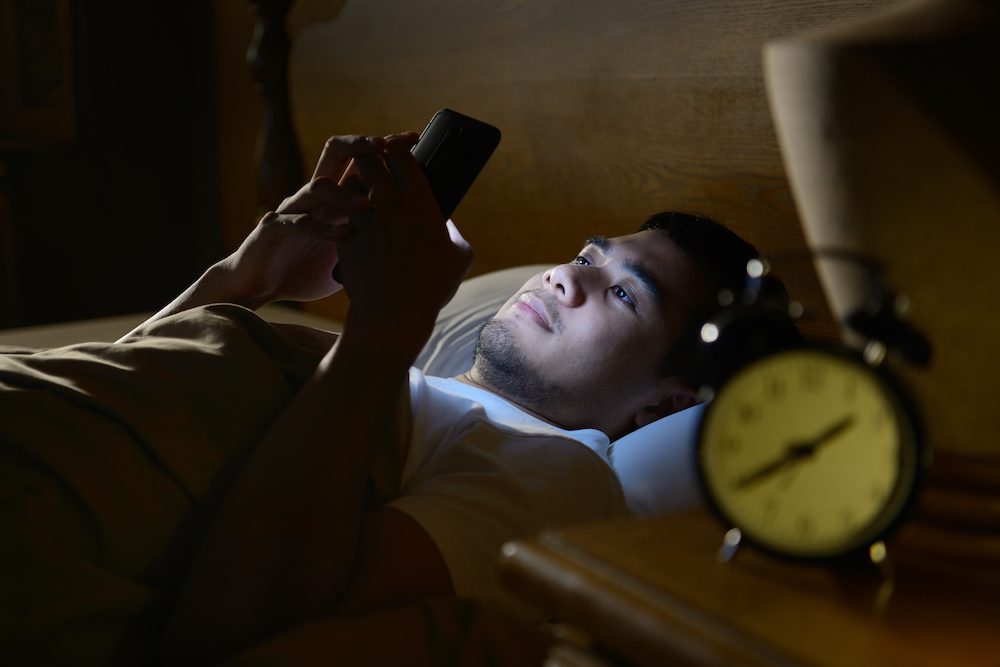High-quality sleep is essential for good health, and a lack of sleep can lead to irritability, trouble concentrating, and poor performance at work. Unfortunately, roughly one-third of adults in the U.S. sleep fewer than the recommended seven hours a night on average.
Improving your sleep may first require improvements to your habits— and following a healthy, consistent bedtime routine. Creating and maintaining a bedtime routine can help you get the sleep you need to feel well-rested and alert the next day. We’ll cover the pillars of sleep hygiene, a set of recommendations involving both changes to your nightly behaviors and modifications to your sleep environment.
Go to Sleep and Wake Up at the Same Time
Sticking to a consistent sleep schedule every night can be tricky, especially on the weekends when people tend to stay up later. However, establishing regular times to fall asleep each night and wake up each morning is an important first step toward creating an effective bedtime routine.
Avoid Caffeine Before Bed
Caffeine is a stimulant that creates temporary feelings of alertness, which can interfere with your sleep cycle. The effects of caffeine usually peak about 30 minutes after consumption. For most people, drinking coffee or caffeinated soft drinks in the morning or early afternoon has a minimal effect on nighttime sleep. However, caffeine can continue to have noticeable effects for up to seven hours after you have consumed it, so it is best avoided in the afternoon and evening.
Trouble Sleeping?
We can help. Tell us about your sleep to get a free Sleep Doctor score with recommendations for better sleep.
Maintain a Comfortable Room Temperature
Your body temperature drops as part of your normal sleep cycle. Although some people may be inclined to raise the temperature of their bedroom or bundle up with cozy blankets to stay warm, studies have shown that an overly hot bedroom environment can interfere with sleep and cause fatigue the next day. Setting the thermostat a few degrees cooler generally promotes better sleep. Taking a warm shower or bath before bed can also help you relax by promoting a natural cool-down effect afterward.
Practice Stress Relief Techniques
Stress due to work, family life, and other factors has been linked to trouble relaxing at bedtime. Whether you enjoy meditating, a bedtime yoga routine, or a warm evening bath, finding ways to alleviate stress may help you fall asleep more easily. If a racing mind is keeping you up at night, it may help to jot down your thoughts on paper so you can mentally shelve your obligations until the morning.
Avoid Alcohol and Nicotine at Night
Smoking and drinking alcohol can both disrupt your sleep cycle, albeit in different ways. Nicotine, like caffeine, is a stimulant that elevates feelings of arousal and wakefulness. This is true of smoking, as well as nicotine patches. Quitting smoking is also associated with sleep problems, but these issues typically clear up within a few weeks. By contrast, many people fall asleep more quickly after consuming alcohol, but sleep problems may occur later in the night after the alcohol has been metabolized.
Minimize Your Screen Time
Electronic devices with screens such as smartphones, tablets, laptops, and televisions emit blue light. This light can suppress the production of melatonin, the sleep hormone, and make falling asleep more difficult. Recent studies suggest that using screen devices for two hours or longer in the evening can impact your sleep. Avoid scrolling and streaming while in bed and reserve the bed for sleeping.
Dim the Lights
The circadian rhythms that guide our sleep-wake cycles are largely based on exposure to natural light. This is why we feel more alert during the day and begin to feel tired after the sun sets. Exposure to artificial light in the evening essentially tricks your brain into thinking it is daytime, which can interfere with melatonin production. For this reason, maintaining low light levels and removing electronic screens from your bedroom can help you prepare for sleep in the hours before bedtime.
Block Outside Noise
Ambient noises during the night have been linked to sleep disturbances. Some studies also suggest nighttime noise can increase the risk of stroke or cardiovascular disease. If you are unable to guarantee a quiet bedroom environment, consider masking noise with the aid of white noise, ambient sounds, or relaxing music.
Experiment with Soothing Scents
Certain smells are believed to have calming qualities that can promote feelings of relaxation and tiredness. These include essential oils such as lavender oil. If you have a hard time relaxing before bedtime, consider using essential oils to help you wind down.
Consider Replacing Your Mattress
Mattresses develop impressions and indentations over time. This type of wear and tear is to be expected, but it may compromise the mattress’ ability to provide the needed pressure relief and support. A new mattress can not only help you sleep better, but also alleviate aches and pains for people with back problems. The average mattress performs for seven years before it needs to be replaced.
People with insomnia and other sleep disorders may have difficulty falling or staying asleep despite following sleep hygiene guidelines. If you still struggle to fall asleep after taking these measures, talk to your doctor about additional steps for improving your sleep.
References
Ask the Sleep Doctor
Have questions about sleep? Submit them here! We use your questions to help us decide topics for future articles, videos, and newsletters. We try to answer as many questions as possible. You can also send us an email. Please note, we cannot provide specific medical advice, and always recommend you contact your doctor for any medical matters.









